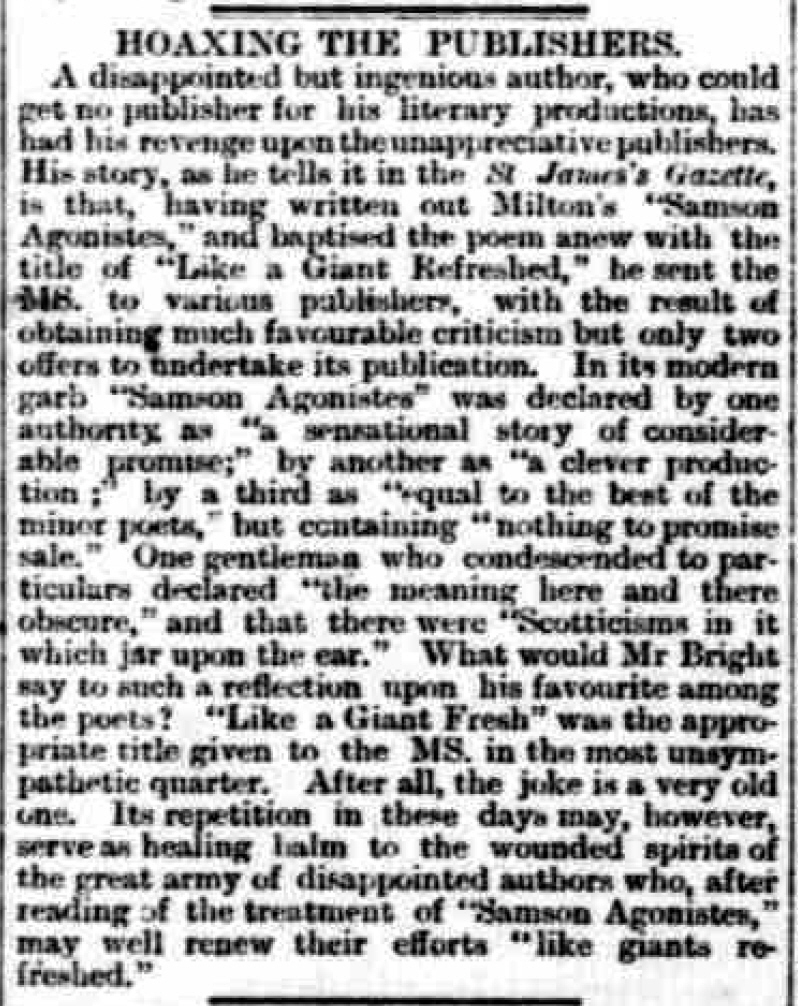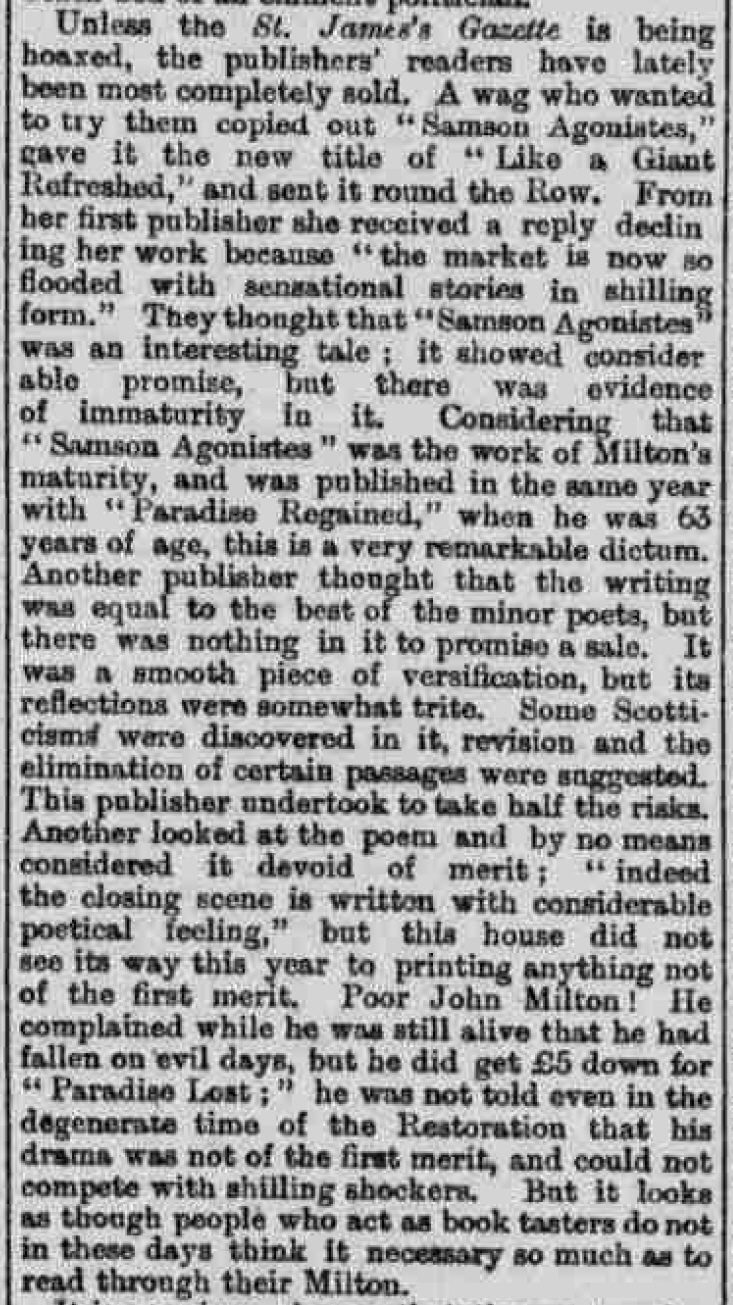ROBERT WILLIAMS BUCHANAN (1841 - 1901)
|
ROBERT WILLIAMS BUCHANAN (1841 - 1901) |
|
|
|
|
|
|
|
|
‘Like a Giant Refreshed’
I have to thank Dr. Mikhail Simkin for alerting me to this. I’d not come across this tale of a literary hoax before and I’ve failed to find any evidence confirming Buchanan’s involvement, but it does seem like the sort of thing he would do. St. James’s Gazette (17 October, 1887 - pp.5-6) CORRESPONDENCE. THE PUBLISHER EXPOSED. To the EDITOR of the ST. JAMES’S GAZETTE. SIR,—The experiment noted below I found called-for in the interests of my self-respect, and I dedicate it to all the persons who would become littérateurs if the publishers would let them. Having differed with these literary police as to the value of a manuscript of my own, I resolved to try them with a manuscript of somebody else’s. So I copied out “Samson Agonistes,” gave to it the taking title of “Like a Giant Refreshed,” and sent it the round. Not for years (indeed not since I wrote that other manuscript) have I enjoyed myself so much. The following are some of the replies I received. I omit names, but enclose my card— not necessarily as a guarantee of good faith. Paternoster-square, E.C., 11/7/87. Sir,—The above manuscript has received our careful attention; but we regret to say that we would not care to publish it. The market is now so flooded with sensational stories in shilling form that it is questionable whether yours would find its way to the bookstalls, where alone it would be likely to sell. Although, however, we must decline your interesting tale, we may say that we consider it a work of considerable promise, and that if, as we gather from certain discrepancies, it is a first work, you will probably do something much better yet. Kindly enclose stamps and we shall return it without delay.—Yours, etc. The next letter I quote because it is one of the few answers which referred to the work as a poem. I treasure it on that account. The address in this case would reveal the firm. Sir,—By this post we regret to return your poem entitled “Like a Giant Refreshed,” which you were so good as to submit for our consideration. When we say we look upon it as a clever production you may wonder why we do not undertake its publication. The fact, however, is that the market is glutted with verse at present, much of it of considerable merit. In ‘Like a Giant Refreshed’ we find writing equal in our opinion to the best of the minor poets (if you will pardon our saying so), but nothing to promise a sale. In prose a work may do well though it does not rise above a certain standard; but there are so many versifiers nowadays that the same cannot be said of poetry. “Like a G. R.” is a smooth piece of versification and contains some musical lines as well as elegant turns of thought, but its reflections are somewhat trite and the meaning here and there is obscure. We fancy it might be improved by revision and the elimination of certain passages; there are Scotticisms in it, for instance, which jar upon the ear. At the same time we cannot advise in this matter, nor undertake to say that it would be worth your while to rewrite the poem. After that the manuscript was returned to Paternoster-square, and this time I had the gratification of being taken for a lady. The publishers, it will be observed, are too wary to classify it as a story or poem. They refer to it as “the book.” Dear Madam,—We have read your book with much pleasure, and consider it very bright and clever. We shall be happy to publish it in a small volume (specimen of page enclosed) on the following terms. The risk in issuing a first work is, of course, considerable; and, high as our opinion of the book is, we could not undertake to publish it entirely at our own risk, We are, however, prepared to take half the risk—namely, £30, if you provide another £30; and on receipt of your cheque for that amount we shall forward you a printed form to fill up, and go to press with the book at once. We would recommend you to consider this offer seriously. The book would make a hundred pages such as the enclosed specimen, and we would print for the first edition 2,000 copies. Taking off the cost of production, you would receive half the profits on the sales—say about £100 (one hundred pounds) if all copies were sold. Books that take well go through several editions. Requesting the favour of a reply, we are, etc. With the above should be compared the following:— Sir,—In answer to your favour of the 14th, enclosing manuscript called “Like a Giant Fresh,” we are prepared to publish it if you take the entire risk of production. A thousand copies would cost you about £65. Should this arrangement not suit you, we shall return the MS. on receipt of stamps.— Yours, etc. “Like a Giant Fresh” struck me as good; but perhaps the worst affront we got (by “we” I mean Milton and myself) was from another publisher, who wrote as follows:— Sir, —We have looked through the manuscript which you were so good as to forward to us, and we herewith return it to you with many thanks. We by no means consider your poem devoid of merit; indeed, the closing scene is written with considerable poetical feeling. We have, however, already made out our list of new books for the coming season, and so many important works are to be found among them that we do not see our way to printing anything this year that is not of the first merit.—We remain, etc. That publisher sent me his printed list of books of the first merit inside the covers of the rejected manuscript. It included “There’s the Rub!” (three vols.), “ Daisies Pied and Violets Blue,” “Who Poisoned Mrs Marjoribanks?” “Telling Talks with Sunny Seers,” “Peeps at Philosophy,” and “What Can I Do with Sixpence?” It was no wonder that “Samson Agonistes” was crowded out. ___
The hoax attracted comments from several other papers: The Edinburgh Evening News (18 October, 1887 - p.4) |
 |
|
The Liverpool Mercury (18 October, 1887 - p.5) |
 |
|
And the letter was reprinted, almost in its entirety, in The Press of Canterbury, New Zealand on 19th December, 1887, with the following introduction: ‘A LITERARY HOAX. Since Mark Twain, when editing a San Francisco journal, published a verse of “The Assyrian came down like a wolf on the fold,” and declared that the production, though not without merit, was not up to the literary standard of his paper, thereby bringing down upon his head a shoal of letters from indignant correspondents blind to the joke, who pointed out that Byron was the author of the rejected verses, no more amusing hoax has been recorded than is contained in one of the last numbers of the St. James’s Gazette. A correspondent, identified with Robert Buchanan, writes to the editor:—’ ___
I can’t really add much more. Buchanan did sign some of his anonymous contributions to The Saint Pauls Magazine as ‘B.’ but that’s hardly compelling evidence. The style of the piece is similar to his essay, ‘The Newest Thing In Journalism’, and the comment about the publisher’s list of new books recalls a letter Buchanan wrote to Andrew Chatto complaining that The City of Dream was being “sandwiched between such works as Mark Twain & Mary Ann Married!” Buchanan was fairly settled at this time, following the success of Sophia, so he could have just been in a playful mood. Or, if one wants to look for other motives, he was preparing for the publication of The City of Dream, so perhaps was laying the groundwork for a response to the inevitable bad reviews. Or perhaps this had something to do with Buchanan’s intention to become his own publisher, which first arose a few months later, when in May, 1888, he began the long process of buying back the rights to his poetical works from Chatto & Windus. Or, B. could be someone else entirely, in which case, he has my apologies.
|
|
|
|
|
|
|